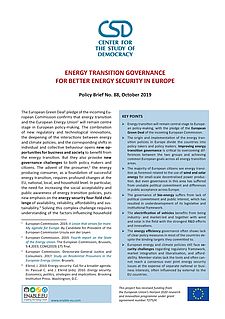CSD Policy Brief No. 88: Energy Transition Governance for Better Energy Security in Europe
CSD Policy Brief No. 88: Energy Transition Governance for Better Energy Security in Europe
Author(s): Todor Galev
Subject(s): Social Sciences, Economy, Energy and Environmental Studies, Sociology, Economic development
Published by: Център за изследване на демокрацията
Summary/Abstract: The European Green Deal pledge of the incoming European Commission confirms that energy transition and the European Energy Union will remain centre stage in European policy-making. The combination of new regulatory and technological innovations, the deepening of the interactions between energy and climate policies, and the corresponding shifts in individual and collective behaviour opens new opportunities for business and society to benefit from the energy transition. But they also provoke new governance challenges to both policy makers and citizens. The advent of the prosumer, the energy producing consumer, as a foundation of successful energy transition, requires profound changes at the EU, national, local, and household level. In particular, the need for increasing the social acceptability and public awareness of energy transition policies, puts new emphasis on the energy security four-fold challenge of availability, reliability, affordability and sustainability. Solving this complex challenge requires understanding of the factors influencing household prosumption choices, in the first place. But it also calls for adequate energy transition policy choices and effective tools to steer quickly through the changing energy security landscape.Europe, as a large energy consumer faces different choices from individual member states. Navigating these choices has become more complex and challenging amid continuing environmental challenges, the souring of US – China trade relations and the resurgent Russia confrontation. Consumers have grown more concerned with the rising cost of energy transition, in particular in lower income member states in Central and Eastern Europe. Russia’s strategic political projects in gas supply like Nord Stream 2 and Turkish Stream have divided the European Commission and member states. Similarly, LNG terminals and shale gas development have attracted supporters and opponents, with no common European policy in sight. New nuclear power plants such as Paks II in Hungary, Hinckley Point in the UK, Belene in Bulgaria have underscored the importance of designing and implementing socially inclusive and sustainable policies alongside the economic benefits and energy security.
Series: Center for the Study of Democracy - CSD Policy Briefs
- Page Count: 8
- Publication Year: 2019
- Language: English
- Content File-PDF
- Introduction

